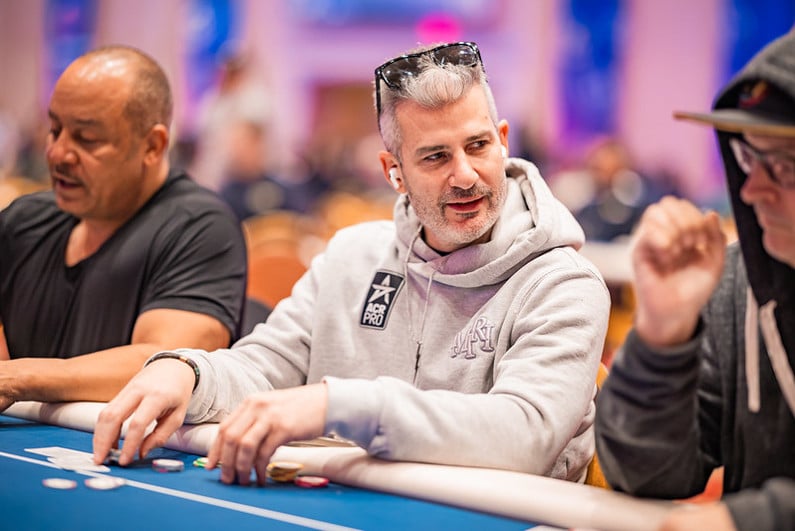WSOP folklore
The 2023 World Series of Poker is about to begin, the largest festival of wealth redistribution on the poker calendar. Hundreds of millions of dollars will exchange hands as tens of thousands of players take their shots in the desert. Gluttons for punishment, they will enter and re-enter, dogged in their pursuit of cashes, final tables, and those gaudy pieces of wrist candy.
to grow aweary of the sun and wish for the state of the world to be undone
I shall eventually be among them, trying to chase my dreams and crush those of others. I shall eventually board a couple of planes to Las Vegas to test my skills and try my luck. For the month of June, however, I will bide my time, waiting for my would-be opponents to tire, to get stuck and up-stuck, to grow aweary of the sun and wish for the state of the world to be undone.
Starting next week, and for the next five weeks, I will be writing about five iconic WSOP (or WSOP-adjacent) hands, moments that still inspire to this day, pieces of folklore in a wild and degenerate world. To whet the appetite for that, I want to now discuss one of my favorite poker hands – a WSOP moment that could have been, a poker mulligan of sorts.
Matloubi triumphs while “The Kid” blinds out
In 1990, Stu “The Kid” Ungar had the chance to win the WSOP Main Event for the third time, having been previously crowned champion in 1980 and 1981. He held a commanding chip lead on the penultimate day, but the next morning he never showed up.
Ungar had been staked into the event by his friend Billy Baxter who went looking for his missing horse. “The Kid” was eventually found unconscious on his hotel room floor, having overdosed on cocaine. He was rushed to hospital, never returning to Binion’s Horseshoe Casino, where his stack blinded off in 9th place.
a virtuoso performance by Matloubi
The winner of the Main Event that year was Matsour Matloubi, an Iranian-British player who defeated Hans “Tuna” Lund to take home the $835,000 first prize. It had been a virtuoso performance by Matloubi, who followed it up with a second-place finish in another $10,000 tournament for $160,000 just a few short months later. He was being dubbed “The New Stu Ungar” owing to his loose-aggressive style.
According to Peter Alson and Nolan Dalla in their wonderful biography about Ungar, One of a Kind, Matloubi’s rising star infuriated a recovering Ungar. The following year, Ungar challenged Matloubi to a heads-up, winner-take-all match for $50,000. Matloubi accepted and the duel eventually took place at the Four Queens in early 1991.
The hand
When the two titans took their seats, there was more than money on the line. Matloubi took an early lead, but was pulled back by the ultra-aggressive Ungar. The stacks were $60,000 to $40,000 in Ungar’s favor when the following hand took place:
Pre-flop
The blinds were $200/$400 with no ante. Ungar had the button and he raised to $1,600 with T♠9♥. Matloubi called.
Flop
With $3,200 in the middle, the flop came 7♠3♥3♦. Matloubi checked and Ungar bet $6,000, almost double the pot. Matloubi called.
Turn
There was $15,200 in the middle and the turn brought the K♣, so the board read 7♠3♥3♦K♣. The action went check, check.
River
With the pot still at $15,200, the river came the Q♥ so the final board read 7♠3♥3♦K♣Q♥. Matloubi shoved for $32,400, more than double the pot. According to eyewitnesses, Ungar sat forward in his chair and said: “you’ve either got 4-5 or 5-6, I call.” A dumbfounded Matloubi rolled over the 5♦4♣ and Ungar’s “soul read” had earned him the victory and the $100,000.
Analyzing the grudge match
T♠9♥ was a fine hand to raise at 100 big blinds deep. While this was obviously a large pre-flop open size from Ungar by today’s standards, it certainly wasn’t large for the day. In fact, Ungar is often regarded as one of the small ballers of the day, preferring to 3x and 4x when others liked to 6x. Matloubi’s call with 5♦4♣ would be a theoretical fold versus the large size deployed but again, it would be a fine defend versus a standard open.
calls of this nature on those kinds of boards represented monsters
On the flop, Ungar had a clear continuation bet, but his size was massive. One-third pot would be the solver’s preference and that would get the job done versus most of Matloubi’s holdings. Matloubi’s call to this bet seems to be a bit optimistic on first glance but being sticky here is reasonable in the context of having a minimum defence frequency. Also, to try to embrace the meta-game of the day, calls of this nature on those kinds of boards represented monsters (trips or boats), so a reasonable hand to have to balance is a gut-shot so that you can improve to a monster.
The check-check on the turn seems fine. Matloubi could construct a leading range on this card but checking has merit. After the flop action, Ungar should have been worried about Matloubi having a big hand.
Matloubi arrived at the river with his worst holding, so he has an ideal bluff candidate. His choice to more than 2x pot was hugely polarizing and it is possible that it is that which spelled his doom. Ungar’s big flop bet followed by a turn check was very weak, so if Matloubi wished to get value from his monster holdings, wouldn’t he have bet smaller? Levels on levels notwithstanding, I think that Ungar understood that and his spider-senses immediately tingled.
Old-school wizard
It was the grudge match of the day between two men, both with points to prove. Matloubi was the reigning Main Event champion and the first from outside of America. He was desperate to show the poker world that he was no one-hit-wonder, that he was capable of taking on the best mano y mano and winning. Ungar had embarrassed himself at the 1990 WSOP and there were many who thought that he was a washed-up junkie has-been, a child genius who had ultimately succumbed to his demons.
While you cannot take too much from one match and certainly not one hand, this hand was such a special example of card sense, a quality that Ungar had in such abundance that one is tempted to wax lyrical about him. Such is the manner with which he not only fathomed the above-the-rim line that Matloubi had taken, but had the conviction to make a call like that, one is tempted to get carried away. So here goes…
There’s no one that ever beat me playing cards, the only one that ever beat me was myself.”
Stuey Ungar was a once in a generation player – an old-school wizard, a fearless maven with an eidetic memory, a ferociously competitive spirit, and raw card-playing talent. In 1997, after winning the WSOP Main Event for the third time, he said: “There’s no one that ever beat me playing cards, the only one that ever beat me was myself.”
I think that he was probably right.




